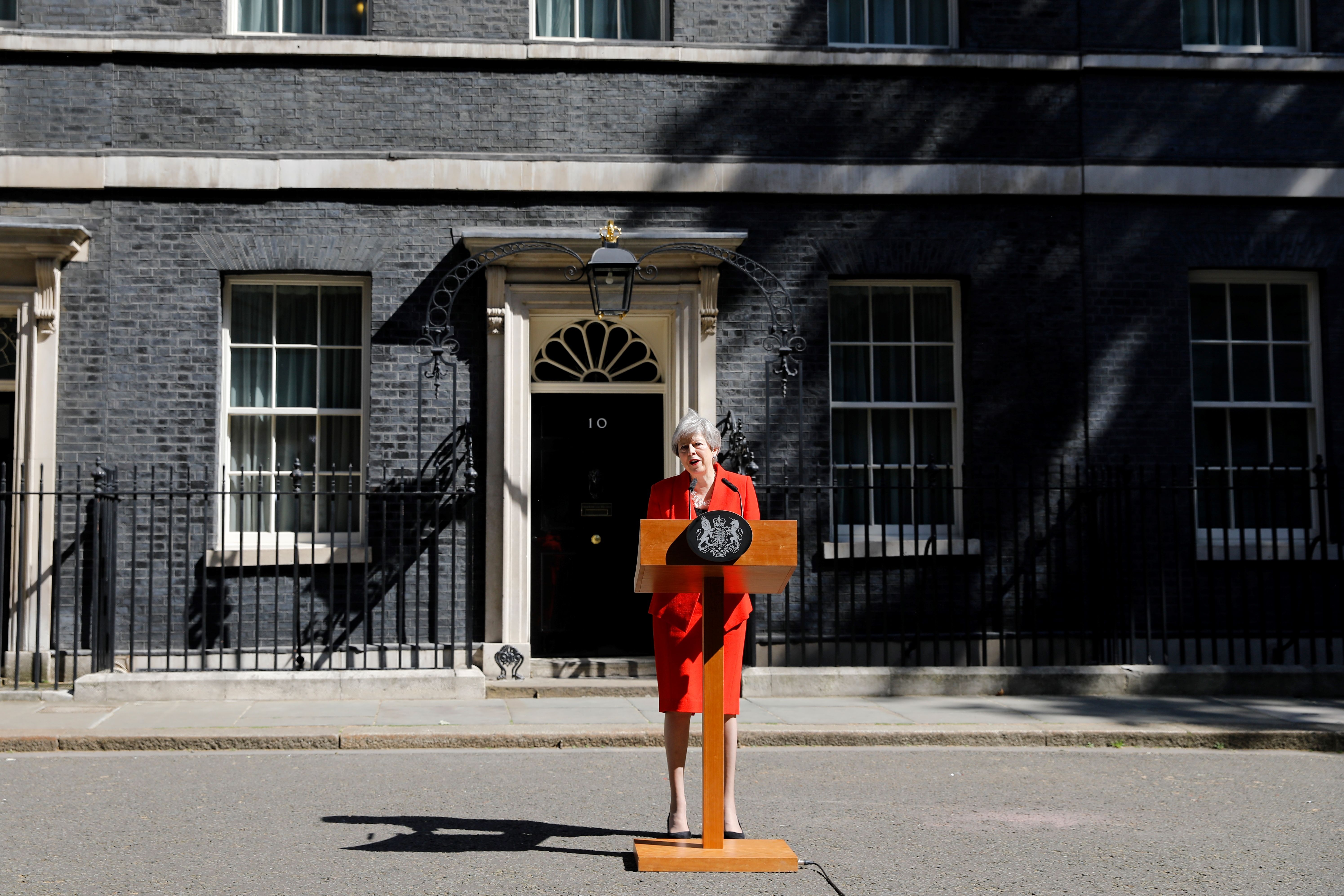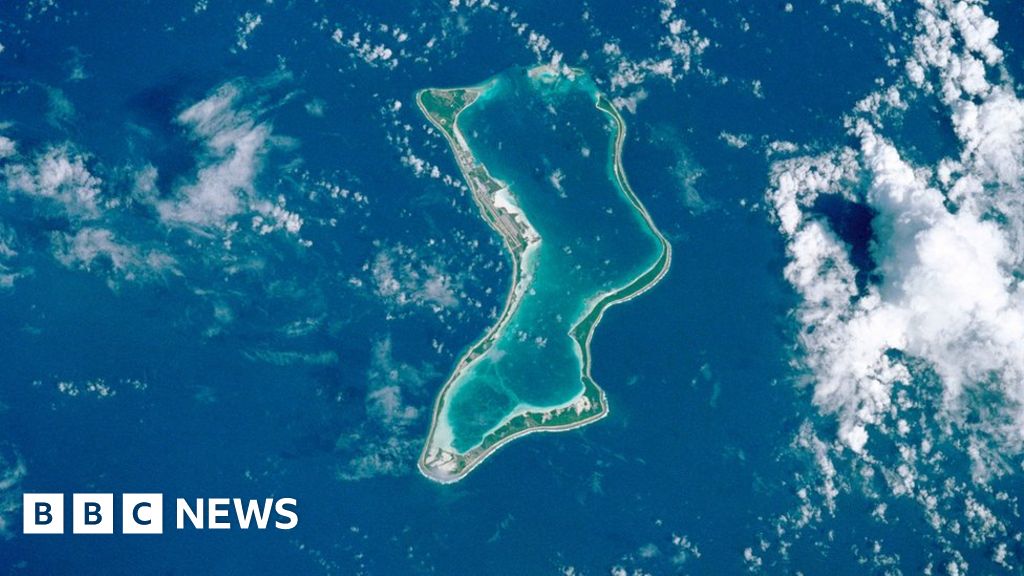
LONDON—Theresa May said she would quit as British prime minister once her party chooses a successor after failing repeatedly to win parliamentary backing for the Brexit divorce agreement she negotiated with the European Union.
With little prospect of getting her deal passed, three years after the U.K. voted to leave the bloc, Mrs. May said the race to find her replacement would formally begin after she quits as head of her party on June 7.
“It is now clear to me that it is in the best interest of the country for a new prime minister,” she said during a statement on the steps of 10 Downing Street. Mrs. May, her voice breaking, spoke of her sadness at no longer serving as prime minister and urged lawmakers to compromise over Brexit.
The decision formally sets off a race to succeed her as the leader of the Conservative Party and of the government, one that is likely to be won by a supporter of a sharper breakaway from the EU than that embodied in Mrs. May’s deal. Conservative officials aim to select a new leader by the end of July.
After May
If the Conservatives succeed in forcing Theresa May to resign, here’s what needs to happen for the next Prime Minister to take office.

Candidates must be proposed and seconded in writing
If there are more than three candidates, Conservative MPs vote in multiple rounds, with the one gathering the least votes dropping out, until there are two candidates left
All party members get to vote on the remaining two candidates
The new leader would become the new Prime Minister and would not be obliged to call
an early election
Source: House of Commons
Among the questions that loom large for the next prime minister will be whether to push for a no-deal exit from the bloc on Oct. 31 and whether to attempt to break a log jam in Parliament by calling a general election.
“Whoever becomes the new Conservative leader must let the people decide our country’s future, through an immediate General Election,” said opposition Labour Party leader Jeremy Corbyn on Friday.
Mrs. May, who voted for keeping Britain in the EU, was nominated as prime minister after the 2016 Brexit referendum, promising to deliver a total break with the EU. Unwinding 45 years of trading relations proved hard to deliver, however, and Mrs. May was ultimately trapped between Conservative ministers and lawmakers who wanted an abrupt and total departure from the EU and those who advocated keeping close economic ties with the bloc.
“It is, and will always remain, a matter of deep regret to me that I have not been able to deliver Brexit,” Mrs. May said.
Mrs. May’s effort to forge a middle path ended up alienating both factions. Disenchantment was amplified after she called an election in 2017 that cost the Conservatives their majority in Parliament.
It isn’t clear who will now lead the monumental task of steering the U.K. out of the EU. Conservative lawmakers have been jostling for months to position themselves as future party leaders.
“To succeed, he or she will have to find consensus in Parliament where I have not,” Mrs. May said.
Several of those at the front of the pack, including former Foreign Secretary Boris Johnson and former Brexit Secretary Dominic Raab, advocate a more abrupt split with the EU than the one Mrs. May hoped to secure, raising the possibility of a likely disruptive U.K. exit from the bloc without a deal.

The pound has been falling against the dollar ahead of the announcement as traders fret about the economic shock of a no-deal Brexit and worry an early election could bring the socialist Labour Party to power.
Investors widely expected Mrs. May’s departure, and the currency edged up less than half a percentage point in the hours after the announcement, trading for $1.271, still close to its lowest point against the dollar all year.
Mrs. May took over as party leader and prime minister after her predecessor David Cameron resigned following the 2016 referendum decision to leave the EU. Her almost three years in charge have been consumed by the effort to take the U.K. out of the EU with the deal she negotiated with the bloc.
Her time in office was punctuated by U-turns and constant political firefighting as she sought to keep her Conservative Party from self-combusting over Britain’s relations with Europe.
Thanks in large part to a hard core of anti-EU lawmakers who said Mrs. May’s deal would keep the U.K. too closely tied to the bloc, she couldn’t push it through Parliament. Brexit has now twice been delayed and the current deadline for quitting the trade bloc is Oct. 31.
The 2016 Brexit referendum, a supposed cathartic process to heal deep divisions in the Conservative Party over the country’s relationship with its biggest trading partner, has instead sowed chaos among Britain’s political class.
On three occasions, Mrs. May tried and failed to get lawmakers to back a divorce deal with the EU. The issue has split both the Conservatives and the opposition Labour Party into groups that believe Brexit should be delivered at all costs; those that think it should only happen on the basis of a deal with the EU; and those that continue to oppose it.
A leadership race will now play out over the summer as Conservative lawmakers vote to whittle potential leaders down to two candidates. The Conservative Party’s 120,000 members then pick their preferred candidate. Conservative members are, on the whole, more in favor of the U.K. leaving with no deal than is the wider pool of Conservative voters.
Under British convention, the prime minister is the leader of the party that commands a majority in the House of Commons, which the minority Conservatives do because they have the backing of the Democratic Unionist Party from Northern Ireland.
Mrs. May’s gradual political demise has given her potential successors ample time to prepare their pitches. Many have already been laying the ground work for the leadership bids. Mr. Johnson, a former foreign secretary who resigned from Mrs. May’s cabinet in protest last year, is a firm favorite to replace her and has already said he would run for leader of the party.
Others, including Mr. Raab and current Foreign Secretary Jeremy Hunt, have been making a series of wide-ranging speeches. Mr. Johnson’s strident pro-Brexit views chime well with a part of the party, but to get selected he will have to win over more party moderates.
Mr. Johnson has one attribute that Mrs. May crucially lacked: he is seen as a vote winner, analysts and lawmakers say.
Despite proving popular with the Conservative base, Mrs. May saw her tenure quickly turn into a prolonged battle of attrition. No British leader in modern times has endured such a sustained revolt from within his or her own party.
A fifth of all British ministers who quit government since 1979 have done so under Mrs. May’s relatively brief tenure. In January, her Brexit plan suffered the biggest British parliamentary defeat in living memory. By then her own party had already tried and failed to oust her.
A small cadre of Conservative lawmakers quit to join a new centrist grouping in protest of her handling of Brexit, a defection of a sort that is rare in the British political system.
Newsletter Sign-up
Mrs. May interpreted the Brexit vote as a cry to clamp down on EU immigration. Many in her party saw it differently. A cluster of libertarian Conservative lawmakers who run an association called the European Research Group, wanted the U.K. to make a sharp break with the EU and cut regulation. Pro-European Conservatives meanwhile wanted close trading ties with the bloc to bolster the British economy.
Both factions were appalled by the deal Mrs. May hashed out with EU leaders last year to get the U.K. out of the EU. The compromise agreement slackened economic ties with the bloc—creating new obstacles for trade—but still left the U.K. relatively closely bound to the EU. It pleased no one. Her refusal to confront either the Brexiteer or the Europhile contingents in the party ultimately cost her the job as leader.
Meanwhile, voters began to abandon the Conservative Party in droves. The ruling party performed badly in local elections earlier this month and was expected to record its lowest ever national vote tally at elections for the European Parliament on Thursday with the one-issue Brexit Party as the main beneficiary.
Mrs. May’s attempt on Tuesday to win over opposition Labour lawmakers by dangling the prospect of second Brexit referendum only served to harden opposition in Conservative circles against her, precipitating her announcement.
Share Your Thoughts
How should the next prime minister approach Brexit? Join the conversation below.
Write to Max Colchester at max.colchester@wsj.com
https://www.wsj.com/articles/british-prime-minister-theresa-may-says-she-will-quit-11558688912
2019-05-24 11:12:00Z
CAIiEGuc5yC_YSvNEK56t65GprEqGAgEKg8IACoHCAow1tzJATDnyxUwiK20AQ


